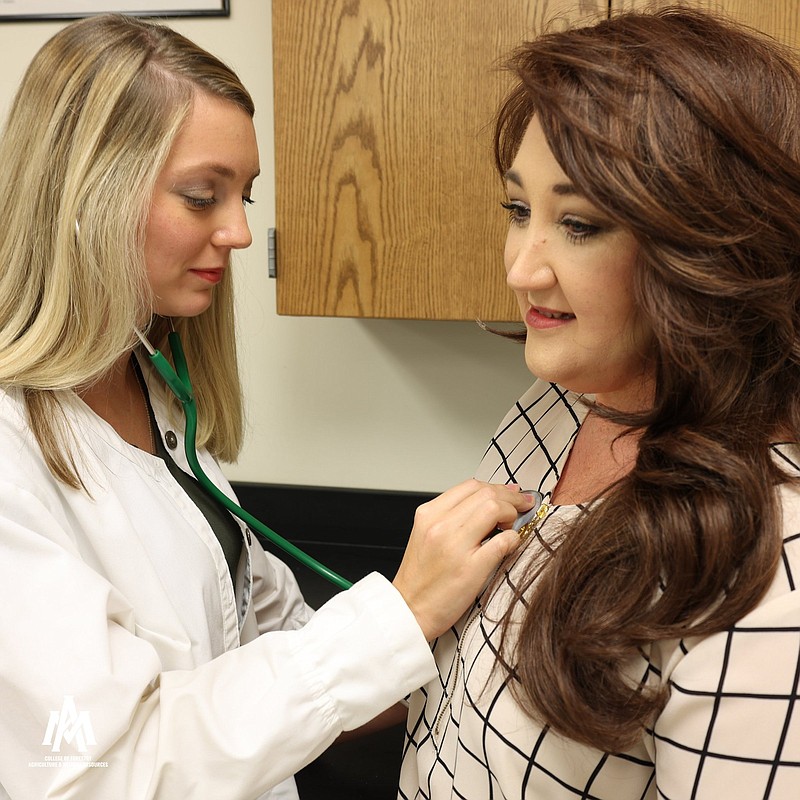The University of Arkansas at Monticello will offer a new master's of science in nursing degree in public health to provide nurses the skills to help patients and their communities live healthier lives.
The program, the only one of its kind in Arkansas, will be offered in June 2022, pending approval from the Higher Learning Commission. The degree will be 37 hours, fully online, with the final 14 hours including practicums. The degree includes direct-care nursing courses and courses focused on public health policy, economics, education and leadership.
"The goal of the master's of science in nursing degree is to expand all nursing opportunities and to reach all communities," said Brandy Haley, who has a doctoral degree, is a registered nurse and is dean of nursing at UAM. Haley has been a nurse for more than 25 years, with a decade of practice in public health.
"This degree teaches RNs [registered nurses] at a graduate level to connect resources in the community to create a healthier population," Haley said.
In 2019, Arkansas ranked 42nd out of the 50 states in the Commonwealth Fund's scorecard on state health care. The low rankingwas linked to many factors, including the number of adults who report poor or fair health, hospital 30-day mortality rates, and the number of children needing a medical or dental preventive care visit, all measures for which Arkansas is ranked last among the states.
SEEING THE NEED
Destiny Allison, a registered nurse who graduated from UAM in 2016, spent five years as an intensive care RN at Jefferson Regional Medical Center at Pine Bluff. She understands what the state is facing.
"Coming off covid, a lot of patients are seeing heart issues as well as long-term respiratory problems," she said. "In the South, it's hypertension and diabetes."
Many of those patients simply don't have the knowledge they need to keep themselves healthy.
"If we can get nurses with master's degrees, they can help reach those who might otherwise be afraid of the hospital," Allison said. "If we broaden our knowledge, we can better benefit the population."
Allison is the UAM School of Nursing simulation coordinator. The simulation unit provides mannequins that can replicate a range of situations students might encounter on the job without worrying about harming a patient. Allison said she plans to enroll as a student when the master's program opens.
"There is a huge demand," said Haley. "We did a workforce analysis and a survey of all our stakeholders, including our current students, clinical instructors, clinical facilities and employers. We asked them if they saw any benefit in this; it was an overwhelming yes.
"Our students were begging us for a master's program, which is understandable because approximately 90% of our BSN [bachelor of science in nursing] graduates return to graduate school. They want to come back home to us at UAM." she said.
Crystal Halley is UAM vice chancellor for academic affairs.
"UAM is pleased to be the only institution in Arkansas to offer a master's in nursing with an emphasis in public health," said Halley. "The online design of the program offers registered nurses an opportunity to advance their studies while maintaining their employment.
"The program will also serve our region and state by training more nurses to look at their community as a whole in order to determine the needs of that community and promote its overall health," she said.
COURSE REQUIREMENTS
Haley said that "one of our targets are health department nurses. This advanced degree will assist those RNs already in the nursing field. However, public health is in every aspect of nursing, and this degree will benefit all practice settings."
To qualify for the master's program, candidates must have spent at least one year practicing as a RN. Haley said the program can accept bout 60 students a year.
Then, "Students have a job before they graduate," she said.
There will be two tracks for the master's degree. Prospective students with a bachelor's degree in nursing can move through the program in two to five years, depending on how many credits they earn each year.
Students with an associate degree in nursing or a diploma in registered nursing can take from three to seven years.
The degree can have another significant benefit for graduates. Haley said the difference between a bachelor's degree and a master's is about $15,000 a year, depending on population, facility size and locale.
For details, contact program coordinator Christine Felts at (870) 460-1969 or www.uamont.edu/academics/nursing/index.html.
Lon Tegels is with the UAM College of Forestry, Agriculture and Natural Resources.

